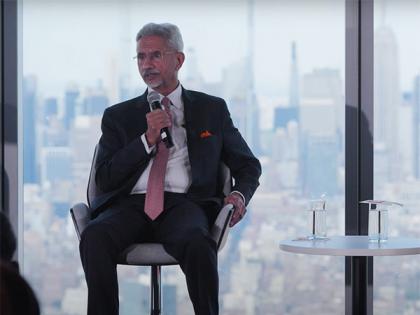"India does have to offer a lot....": Jaishankar jots down three aspects of India's growing global relevance
By ANI | Updated: July 1, 2025 18:44 IST2025-07-01T18:38:06+5:302025-07-01T18:44:00+5:30
Washington, DC [US], July 1 : External Affairs Minister S Jaishankar on Tuesday reflected on the evolution of India's ...

"India does have to offer a lot....": Jaishankar jots down three aspects of India's growing global relevance
Washington, DC [US], July 1 : External Affairs Minister S Jaishankar on Tuesday reflected on the evolution of India's foreign policy, outlining how the country's unique civilisational identity, vast talent pool, and democratic diversity are shaping the country's position on the global stage.
During a fireside chat with Newsweek, the External Affairs Minister highlighted three core aspects that define India's growing global relevance while also reflecting on the changing global landscape and India's role in it.
He highlighted India's historical continuity as a civilisational state, which, according to him, is a rare attribute in the modern world, positioning it as a unique global entity.
The EAM also underscored India's demographic advantage, noting the vast and skilled human capital that the country possesses.
"India does have to offer a lot because, one, we would be a rarity today in the world, a civilisational state, a society which can trace its history for thousands of years and which still today is a nation-state. Very few like that anymore," Jaishankar said.
"We would definitely have a lot to offer as not just the most populated country in the world but the largest pool of talent in an era where talent and human resources are going to count for more," he noted.
Thirdly, Jaishankar also emphasised India's democratic ethos and diversity and its ability to bridge divides, both culturally and geopolitically, in further enhancing its global influence.
"We would also have something special to contribute to the world as a democracy but as a very diverse society which has valued its diversity and nurtured its diversity and finally because we are able to play the role of a bridge," he added.
When asked about the evolution of India's foreign policy, Jaishnakr reflected on the broader shifts in global dynamics, observing that the world has undergone significant changes, necessitating in India's foreign policy evolution.
"India has changed; the world has changed, and worldviews reflect those changes both in ourselves. There's a self-perception as well as how you see the world," he said.
He pointed out that the change in the global economic landscape, with the top five economies today differing markedly from those of the past, is due to the world moving toward an era of multipolarity, characterised by multiple centres of power and influence, according to him.
"If I were to sort of drill it down into two broad points, one would be that, today, if you take the top five economies, they are very different from what they used to be... Any metric of influence is quite different, so you've had a rebalancing in the world accelerated by globalisation, and we are heading towards what most people would regard as an era of multipolarity, which is many centres of power and influence that are autonomous of each other and pursue their particular interest - so that's the global landscape," he explained.
The EAM remark on India's role and position in the multipolar world shows India as a player in a changing geopolitical landscape, engaging with both traditional partners and emerging powers while maintaining strategic autonomy.
Disclaimer: This post has been auto-published from an agency feed without any modifications to the text and has not been reviewed by an editor
Open in app